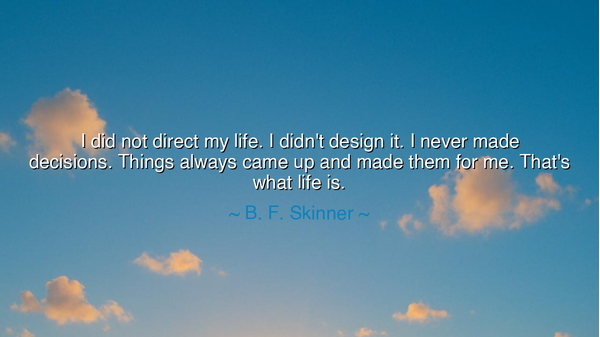
I did not direct my life. I didn't design it. I never made
I did not direct my life. I didn't design it. I never made decisions. Things always came up and made them for me. That's what life is.






When B. F. Skinner, the great thinker of behavior and mind, declared, “I did not direct my life. I didn’t design it. I never made decisions. Things always came up and made them for me. That’s what life is,” he spoke not as one surrendering to chaos, but as one who had seen deeply into the nature of existence. His words are not those of despair, but of acceptance — an acknowledgment that much of what we call control is but an illusion, and that life, in its mystery, moves us more than we move it. In this reflection, the scientist becomes a philosopher, reminding us that to live is not to dominate the current, but to move with its flow.
The origin of this quote lies in the later years of Skinner’s life, when he looked back upon his long journey as a psychologist, inventor, and teacher. Known as the father of behaviorism, he had devoted his career to studying how environment shapes behavior — how every action, every choice, is influenced by forces both visible and unseen. In his experiments with pigeons and people alike, he discovered that behavior was not the free act of an isolated will, but a response to conditions. Thus, when he said he had never “made decisions,” he was not denying his intellect, but revealing his conviction that life itself — circumstance, opportunity, consequence — had been the great architect of his path.
To the modern ear, this may sound unsettling, for we are taught from youth that destiny is ours to command. Yet Skinner’s words hold a different kind of strength — the wisdom of humility. Like a sailor who learns to read the winds rather than curse them, he found freedom not in control, but in understanding. He accepted that the storms and calms of life are not chosen, but met. In this, he joins the company of the Stoics and the mystics, who too believed that the wise man does not seek to bend the world to his will, but to live in harmony with its design.
Consider the story of Charles Darwin, who, like Skinner, might never have set his course by design. When the young Darwin boarded the HMS Beagle as a companion to the ship’s captain, he was not seeking to revolutionize science — he was seeking adventure. Yet that voyage, unplanned in its grandeur, gave rise to the theory of evolution, reshaping humanity’s understanding of itself. Chance opened the door; curiosity walked through it. In this way, life “made the decisions” for him, and he, by accepting what arose, found his purpose. So too did Skinner see that the hand of chance, when met with readiness, can become the hand of destiny.
What Skinner teaches, then, is not resignation, but presence. To say, “things came up and made the decisions for me,” is to admit that life unfolds in ways beyond calculation — and that the task of the wise is not to resist this unfolding, but to respond to it with clarity and courage. The river of life carries us, yes, but we may still steer our vessel, not against the current, but with it. The moments that shape us — a meeting, a loss, a sudden opportunity — often arrive uninvited, yet they demand our participation. Freedom lies not in control, but in awareness — the ability to act rightly within what appears.
And yet, there is also tenderness in his words, a whisper of the fragility of human control. Skinner’s insight reminds us that life is not a fixed design, but a living dance between intention and chance. The greatest composers do not write the song of their lives note by note; they improvise, guided by the melody of circumstance. The artist paints with what colors he is given, and in doing so, discovers new shades. Thus, the lesson is not that we are powerless, but that power itself is born of adaptation, of responding wisely to what arises rather than clinging to what was planned.
So, O traveler in the stream of time, take this wisdom into your heart: Do not fear the unplanned. Let life surprise you. Learn, as Skinner did, that every event, every obstacle, every unexpected turning, is the raw material of your becoming. Plan as you must, but hold your plans lightly; dream as you will, but let life dream through you. For the river will move whether you fight it or not — but if you learn to listen, to steer with gentleness and grace, you will find, as Skinner found, that life’s greatest meaning lies not in design, but in discovery.
And remember always this truth: you may not direct your life, but you may live it well. To yield is not to surrender; to flow is not to drift. In embracing the unpredictability of life, you join its rhythm — and in that rhythm, you will find not chaos, but peace.






AAdministratorAdministrator
Welcome, honored guests. Please leave a comment, we will respond soon